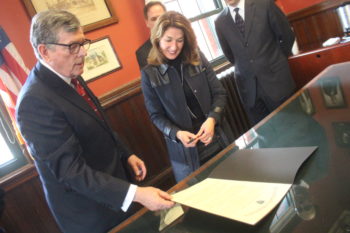Photo:
With a little more than 24 hours remaining to submit nomination papers for the 2018 Town Election, the overriding question would appear to be: anyone out there?
With the deadline of Tuesday, Feb. 13 at 5 p.m. fast approaching, Belmont voters could be rubber stamps on April 3 when eligible voters head for the polls as for the first time in more than a decade, the town could lack a competitive race not just for town-wide offices but also Town Meeting in each of Belmont’s eight precincts.
While a number of residents have taken out nomination papers, many have yet to be submitted for certification as of Monday morning.
According to Town Clerk Ellen Cushman, as of Feb. 12, the potential ballot for the 2018 Town Election sets up to look as below:
- Town Moderator Michael J. Widmer
- Board of Selectmen (three-year term) Thomas Caputo
- Board of Assessors (three-year term) Martin B. Millane, Jr.
- Board of Cemetery Commissioners (three-year termEllen O’Brien Cushman
- Board of Health (three-year term) Stephen Fiore
- Housing Authority (three-year term) Gloria Leipzig
- Trustees of the Public Library (two three-year terms) Elaine C. Alligood and Corinne McCue Olmsted
- School Committee (two three-year terms), Susan Burgess-Cox and Tara Donner
- School Committee (one single year term) Lisa B. Fiore
Unless stragglers come in with their papers, there will be open seats without a declared candidate in each of Belmont’s precincts. The current ballot looks as below:
- Precinct 1: 11 candidates for 12 three-year seats; no candidates for two two-year term.
- Precinct 2: 10 candidates for 12 three-year seats. one candidate for a single year term.
- Precinct 3: 7 candidates for 12 three-year seats;
- Precinct 4: 10 candidates for 12 three-year seats;
- Precinct 5: 11 candidates for 12 three-year seats; no candidates for two two-year term.
- Precinct 6: 11 candidates for 12 three-year seats;
- Precinct 7: 11 candidates for 12 three-year seats; and
- Precinct 8: 11 candidates for 12 three-year seats.

